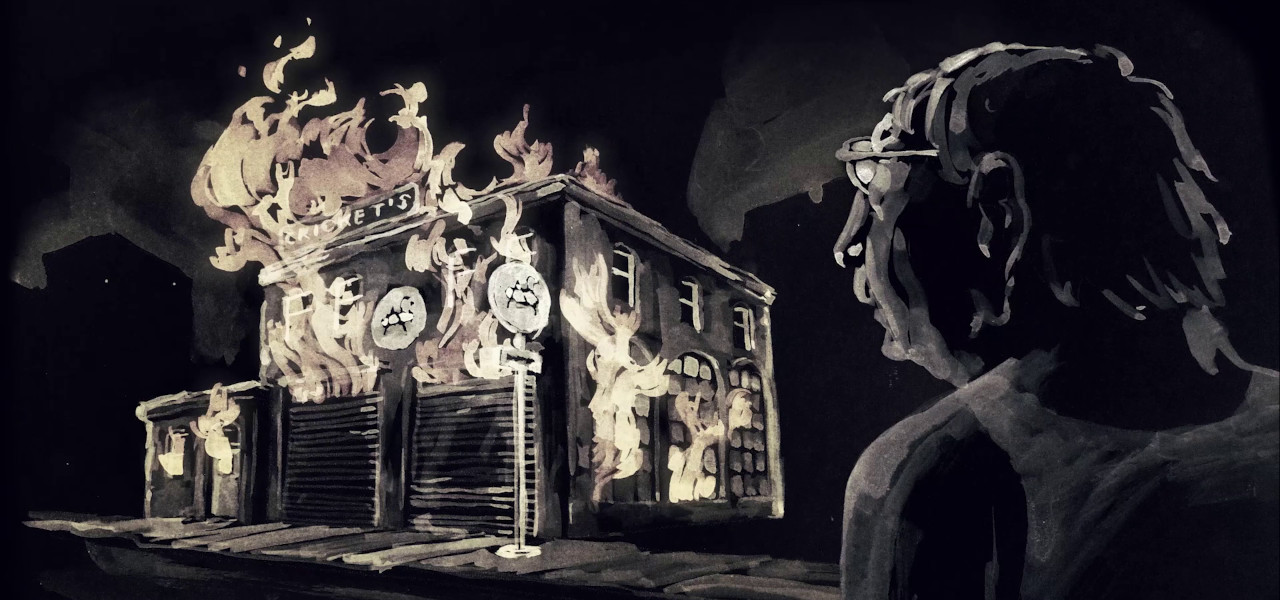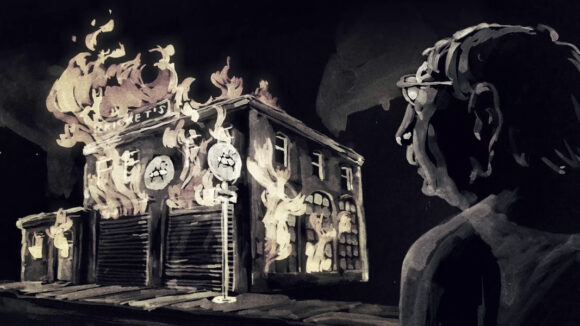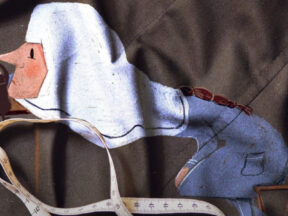

2024 Oscars Short Film Contenders: ‘Ninety-Five Senses’ Directors Jared And Jerusha Hess
Welcome to Cartoon Brew’s series of spotlights focusing on the animated shorts that have qualified for the 2024 Oscars. There are several ways a film can earn eligibility. With these profiles, we’ll be focusing on films that have done so by winning an Oscar-qualifying award at an Oscar-qualifying festival.
Today’s short is Ninety-five Senses from Napoleon Dynamite and Nacho Libre filmmaking team Jared and Jerusha Hess. The film earned its qualification by winning the Grand Jury Award for Best Animated Short Film at the 2023 Florida Film Fest.
Unlike most of the work from the Hess’ much-loved catalog, Ninety-five Senses offers little humor, although there is some, and a deep look at life and how we perceive it through the reflections of a long-time death row inmate finishing his last meal. The film is divided into parts, each dedicated to a sense and animated by different artists, creating a constantly engaging visual experience.
Cartoon Brew: Different people animated each sense segment. How did you find and assign the animators who worked on the film?
Jared and Jerusha Hess: Yeah, Ninety-five Senses is made up of six segments — and each one is rendered by a different animator or animation team.
It ended up being this wonderfully diverse, multicultural collective of artists working on three different continents. We had a solo animator in Brazil, a group in Mexico, one in the U.K., and a handful of artists in our neck of the woods. All of them phenomenally talented.
Believe it or not, the whole thing started as a contest. There’s an organization called MAST in Salt Lake — a non-profit dedicated to empowering up-and-coming artists. They ran a contest called “Voices Seen” and got submissions from all over the world. The winners were chosen to work together on a collaborative piece. Some of these artists are just starting their professional careers, but others have already screened their work in places like Annecy, Tribeca, and Cannes.
What was it about this story or concept that connected with you and compelled you to direct the film?
It’s almost impossible to get into the story without spoiling it. So, spoiler warning.
The film was inspired by footage of death-row inmates awaiting lethal injection in Texas’s Huntsville Unit. It’s the busiest execution chamber in the United States. Chris Bowman and Hubbel Palmer, writers we’ve known and worked with for years, had been doing research in that area, studying “exit interviews” with condemned men. They imagined a prisoner reviewing his life through each of his five senses.
When we read what they came up with, we knew it was special. Funny, sad, smart. References to Chekhov and Ambrose Bierce. A couple of weeks ago, their script for the short was nominated for a Humanitas Prize. It was the only animated project chosen in the Short Film category this year — and, to our knowledge, the first non-Disney/Pixar animated short ever honored.
What did you learn through the experience of making this film, either production-wise, filmmaking-wise, creatively, or about the subject matter?
Covid was our biggest obstacle. That ground everything to a halt for a good while. Although we may have been affected less than other productions since we were always going to be a long-distance endeavor. Huge credit to our producer, Miles Romney, for keeping it going and coordinating everyone’s work.
This is also our first true drama. The tone is pretty distinct from Napoleon Dynamite or our other films. So, the biggest surprise has just been the range of reactions. We’ve had audience members in tears. We’ve had people get super enthusiastic about the film’s “shocking twist.” One woman at a screening told us, “This is really a film about disability,” which we had to admit we hadn’t considered. Then, when we played HollyShorts, they put us in the comedy category…so apparently, our comedic spirit managed to poke through.
Can you describe how you developed your visual approach to the film? Why did you settle on the specific styles/techniques used in the film?
Well, we really tried to match the animators to the sense. We gave the prison monologues to Daniel Bruson — his grungy, bleak watercolors felt right for death row. Nica Harrison’s work is whimsical; she and Scott McHenry had a lot of fun with the “Sight” segment. We chose Michael Grover for “Hearing” because his work is so crisp, and that segment had to convey a lot of actual plot. “Smell” is the most nostalgic sense, so Dallin Penman and Jared Mathews’ cozy style was an ideal match. KC Tobey’s “Taste” segment is more cartoon-like, a literal palate cleanser between the heavier chapters. Finally, Gabriela Badillo’s team was perfect for the dreamy lyricism of “Touch.” Again, the thrill for us is seeing all these diverse styles cohere around the story (helped along, of course, by Tim Blake Nelson’s incredible back-porch drawl). Ninety-five Senses was a true collaboration.

.png)



